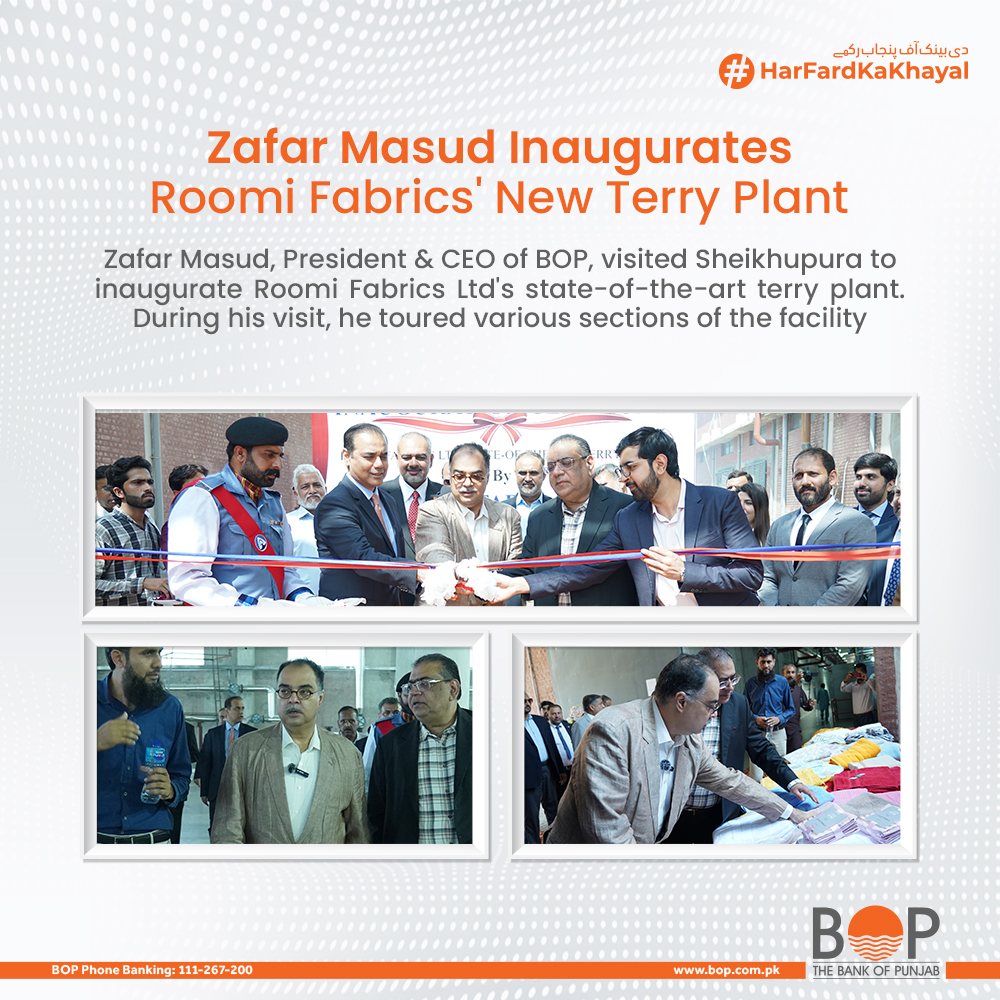
Mr. Zafar Masud inaugurates the New Terry Plant of Roomi Fabrics
Zafar Masud (President & CEO – BOP) was invited to inaugurate the new terry plant of Roomi Fabrics Ltd in Sheikhupura.
During his visit, he explored the facility and admired the cutting-edge technology used in the plant.
Zafar Masud was invited to inaugurate the new terry plant of Roomi Fabrics Ltd in Sheikhupura. During his visit, he explored the facility and admired the cutting-edge technology used in the plant.
Terry is a type of fabric that is typically made from cotton. It is known for its soft, absorbent texture and is often used for towels, bathrobes, and washcloths. Terry fabric is produced on a specialized type of loom called a terry loom. Terry looms have multiple sets of warp and weft yarns, which allows them to create the distinctive looping pattern that is characteristic of terry fabric.
The cutting-edge technology used in Roomi Fabrics’ new terry plant is likely to include state-of-the-art terry looms, as well as other equipment that can be used to produce high-quality terry fabric. For example, the plant may have computerized design systems that can be used to create complex terry patterns. The plant may also have advanced finishing equipment that can be used to give the terry fabric a soft, luxurious feel.
Masud’s visit to the new terry plant is a sign of the growing importance of the textile industry in Pakistan. The textile industry is one of the country’s largest export sectors and it employs millions of people. The investment in new technology by Roomi Fabrics is a positive development for the industry and it will help Pakistan to maintain its competitive edge in the global textile market.
In addition to the economic benefits, the new terry plant is also likely to have a positive impact on the local community in Sheikhupura. The plant will create new jobs and it will boost the local economy. The plant is also likely to attract other businesses to the area, which will further contribute to the economic development of the region.
Overall, Masud’s visit to the new terry plant is a positive development for Pakistan. The plant is a sign of the growing importance of the textile industry in the country and it is likely to have a number of benefits for the local economy.
Roomi Fabrics
Masood Roomi has its roots in the City of Saints – Multan; previously operating under the umbrella of Mahmood Group, a multifaceted business conglomerate founded by honorable Khawaja Muhammad Masood in 1946.
For decades, Masood Roomi has prided itself on its Legacy of Trust, Empowerment via Responsibility and Excellence through Novelty, producing value for stakeholders and giving back to society through several social causes. Masood Roomi has successfully built a diversified, modern and premier set-up of vertically integrated textile, power generation and real estate development businesses.
The business model and practices are embedded in strong ethics, excellence, diversity and innovation that have led the company to establish a global presence. In 2021, Masood Roomi’s massive contribution to the country’s economy was recognized when the company was ranked amongst the “Top 25 Exporters” of Pakistan.
Pakistan’s Textile Industry
The textile industry is the largest manufacturing industry in Pakistan and contributes significantly to the country’s economy. It accounts for over 60% of Pakistan’s exports and employs over 45% of the country’s workforce.
Pakistan is the fourth largest producer of cotton in the world and has a competitive advantage in the production of textile products. The country has a large pool of skilled labor and a well-developed textile infrastructure.
The Pakistani textile industry is vertically integrated, with a strong presence in all segments of the textile supply chain, from cotton cultivation and spinning to weaving, dyeing, finishing, and garment manufacturing.
The industry is export-oriented and its major products include cotton yarn, fabric, and garments. Pakistan exports its textile products to over 100 countries around the world, with the United States, the European Union, and China being the major markets.
In recent years, the Pakistani textile industry has been facing some challenges, such as rising energy costs, inflation, and competition from other emerging markets. However, the industry remains resilient and is expected to continue to grow in the coming years.
The Pakistani government is taking steps to support the textile industry and make it more competitive. The government has introduced a number of policies and incentives to promote investment in the industry. The government is also working to improve the infrastructure and reduce the cost of doing business in Pakistan.
The Pakistani textile industry has a bright future. The country has a number of competitive advantages, such as a large pool of skilled labor, a well-developed textile infrastructure, and a strong presence in all segments of the textile supply chain. The government is also taking steps to support the industry and make it more competitive.